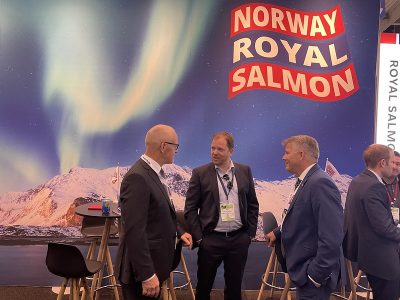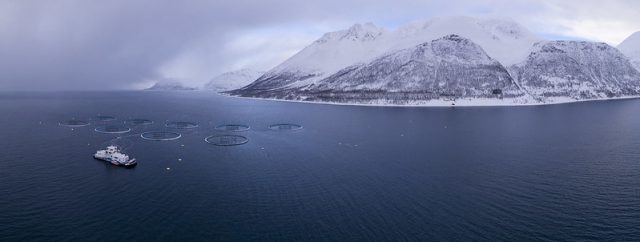Of all the new and higher taxes proposed in the Norwegian government’s highly contested state budget, none has grabbed more attention than the one targeting large and highly profitable salmon-farming and electricity companies. Norway’s powerful salmon lobby was still working hard this week to fend it off, but will likely have to settle for mere revisions.

The Labour Party-led government sees a need to raise or impose lots of taxes in order to rely less on oil revenues to balance the state budget. It found a huge new source of potential tax revenue along Norway’s coastline, which is dotted with fish farms called oppdrett in Norwegian.
The idea is to levy a new tax on the use of natural resources that “everyone” in Norway owns. That includes the waterfalls, rivers and wind that power producers use, and areas of the fjords and bays that salmon farmers use. Such resources, licensed for use by local and state authorities, can allow companies to enjoy relatively low production costs: A kilo of salmon, for example, can cost around NOK 40 to produce, reported newspaper Aftenposten recently, while market prices exceeded NOK 100 earlier this year.
That’s led to some windfall profits and created lots of salmon millionaires and billionaires in small places like Hitra and Frøya over the years. Many of the newcomers on magazine Kapital’s annual lists of the wealthiest Norwegians run fish-farming companies, and the government thinks they should now contribute much more to state coffers. The proposed tax on power producers has also sparked protests, but most of the noise has come from the salmon lobby and local politicians in the communities where fish farms are based.

Even if only the biggest and most profitable fish-farming companies like Salmar and Lerøy are taxed, the Labour-Center government could raise billions in new revenue. It’s a new source of income that’s been praised by economics professors, who call it a “highly legitimate tax” that, according to Professor Steinar Holden, has “the fewest disadvantages” and “minimal negative effects on the economy.”
It has also won editorial support in several of Norway’s largest newspapers. Even the business newspaper Dagens Næringsliv (DN) has called the proposed tax “sensible” and long overdue. It was initially proposed back in 2019 by a commission formed by the former Conservatives-led government, which quickly scrapped the commission’s report after massive protests from the salmon industry.
The current Labour-led government has revived the tax proposal, much to the delight of economics professor Karen Helene Ulltveit-Moe who led the earlier commission. She equates it to a rent charged on natural resources (in this case, the sea, fjords, rivers or wind) that’s called grunnrente, just like other businesses would need to pay rent for factories or other production space.
The tax is also widely viewed as being neutral, without negative effects on a company’s investment and assessed only against some of Norway’s most profitable firms, thanks to measures that would exempt small ones. With seafood exports steadily setting new records, salmon in particular, DN is among media editorializing that “the time is right” for such a new tax that would still be much less than what oil companies pay. Ulltveit-Moe herself called it “a joyful day” when the new tax proposal was confirmed in October.
Opponents, not least the fish-farming companies themselves, strongly disagree, equating it to “coastal robbery” that will harm small communities. Both Salmar and Lerøy threatened they’ll need to lay off hundreds of workers even as both reported record high profits this week. Salmar, which sent out lay-off notices to 851 workers on Monday, claimed the tax will ruin the market for long-term fixed-price contracts and raise uncertainty. Company executives denied the layoff threats were simply a political gesture.
Others viewed the threatened layoffs and wails of protest from the salmon producers as political tactics meant to put further pressure on a government that’s already seen its popularity dive. Taxes often rise with Labour governments and this one is viewed as extreme by the salmon companies.

It’s looking unlikely that they’ll prevail, though, despite all the money they have to pay consultants and PR companies to lead campaigns for them. “The salmon barons have long enjoyed an extremely lucrative business by being able to use the sea to create value,” editorialized newspaper Dagsavisen in September, when news first leaked that the tax would be revived. “It’s therefore reasonable that the biggest companies must contribute more.” A large tax exemption means small companies won’t have to pay the tax at all. Salmon produced in tanks on land will also be exempted.
The less-than 30 companies likely to be assessed the new tax have responded not only with the layoff threats but also with threats to move production abroad, or at least expand outside of Norway to avoid the tax. The government notes that their business has long enjoyed profits much higher than most other businesses: Lerøy Seafood Group, for example, reported a third-quarter profit of NOK 831 million this week, up 44 percent over the same quarter last year on revenues of NOK 7.4 billion, the highest ever. Lerøy attempted to downplay profits, though, by noting that salmon prices have fallen since the second quarter. The companies have also seen their share prices tumble since the new tax was unveiled. The Center Party has calculated, though, that dividends sent to shareholders abroad amounted to nearly NOK 3 billion.
There were, meanwhile, new political signals this week that both Labour and its government partner, the rural-friendly Center Party, are open to certain “adjustments” in the tax after it goes through a hearing process and then is debated throughout the winter. Few expect the tax will be retracted, despite all the industry protests. Finance Minister Trygve Slagsvold Vedum of the Center Party hopes for a broad consensus in Parliament on the new tax this spring.
NewsinEnglish.no/Nina Berglund

